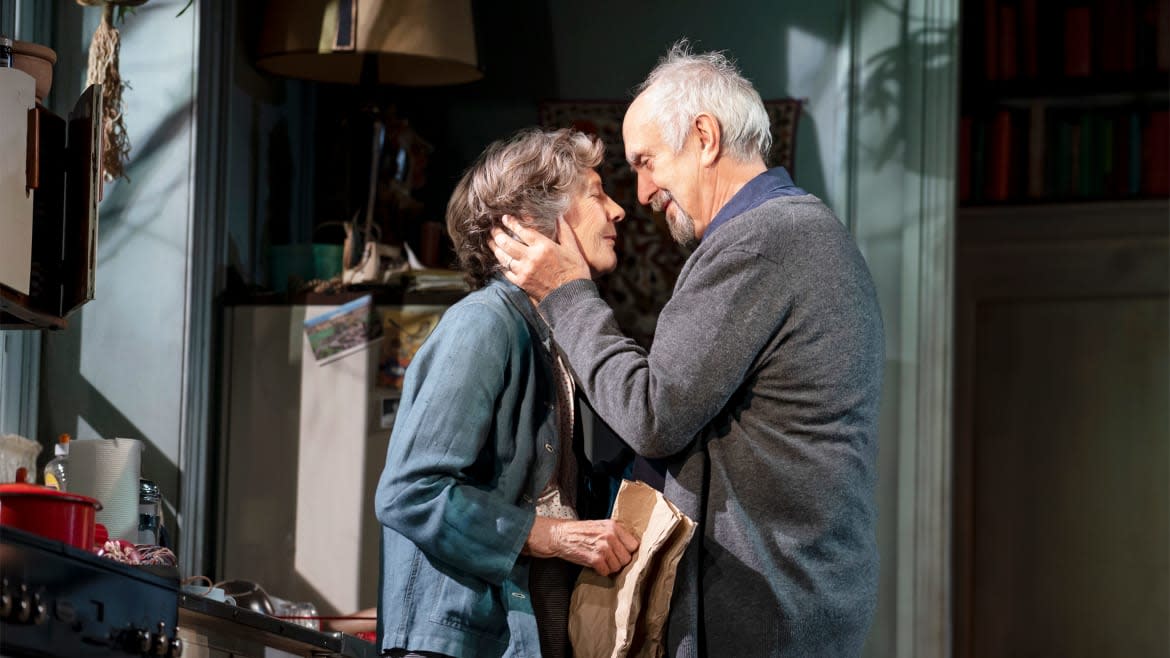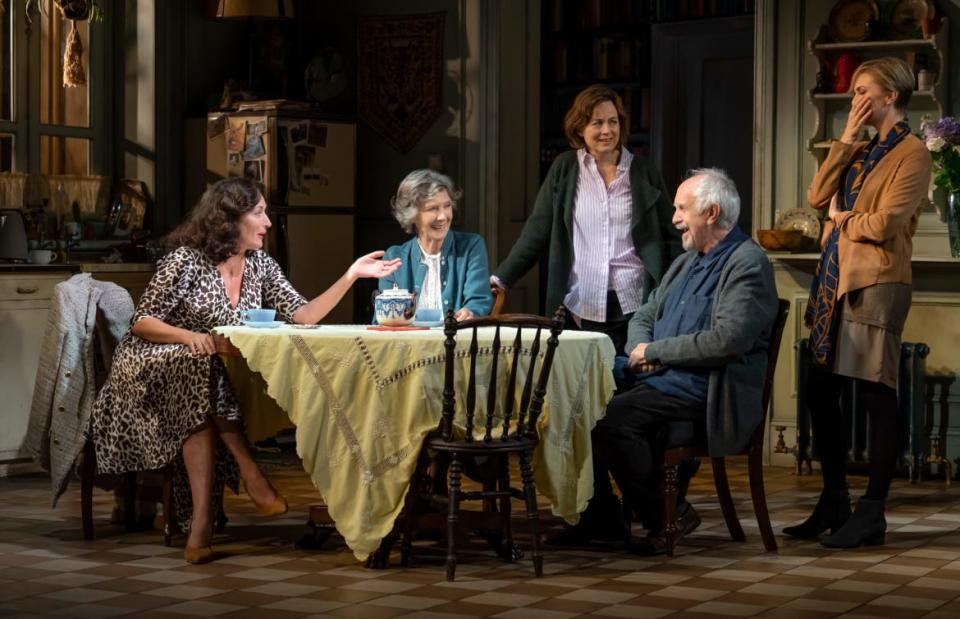‘The Height of the Storm’ on Broadway: Eileen Atkins and Jonathan Pryce Play Both Dead and Alive

It is not unusual for ushers to ask the public to turn their phones off before a play starts. It is unusual to have that instruction be accompanied with the additional phrase “This is a very quiet play.”
At the Samuel J. Friedman Theatre, the usher who said this just before the lights went down was not kidding: Manhattan Theatre Club’s production of The Height of the Storm (to Nov. 24), directed by Jonathan Kent, is truly very quiet.
Indeed, the play, performed to rave reviews last autumn in London, is so quiet and delicately performed that the all-too-familiar kind of theater hell of paper rustlers, whisperers, key janglers, and general fidgeters at a recent Saturday performance sounded even more infernal than usual. The stage seemed far away, the actors somehow recessed on it, and all the usual audience rule-breakers all too loud and present.
Please Just Shut the Hell Up at the Theater & the Cinema
The irony is that this is a hushed piece of drama that you really need to hear, because you will be discussing its weirdness and plot and characters for quite some time afterward. The Height of the Storm is written by Florian Zeller, translated from the French by Christopher Hampton. Most recently in New York, we saw Zeller-translated-by-Hampton’s The Mother, starring Isabelle Huppert, and in that—just as here—a blur of time and perspectives adds a general sense of bafflement to the drama on stage.
In front of us is a beautiful kitchen of what looks like an old house in the countryside, trees looming outside Anthony Ward’s cool and elegant set (he also designed the costumes).
First, we think that André (Jonathan Pryce) is alive, and his wife, Madeline (Eileen Atkins), is dead. Then it seems she is alive, and he is dead. This is revealed in conversations that wheel through time with their daughters, Anne (Amanda Drew) and Elise (Lisa O’Hare), who are worried about what happens next, and what they should do with the family home. The daughters are locked in the dynamics of old sibling rivalry and conflict.
André, as played by Pryce, is a gruff and blustering man adrift in grief and illness, at physical and psychological war with himself. Atkins is wonderful: vinegary, dry, unforgiving, and occasionally judgmental—and their final scene together in the dying light of the kitchen is beautifully tender.
Atkins has a particular steadying pace when it comes to her lines and bearing, a pace that is then imposed on the audience watching her. This beguiling naturalism roots all her character’s interactions and shades. Really, you’d pay to watch Pryce and Atkins perform for 80 minutes just together.

This is their show, with the daughters as supporting characters. There is added confusion over the presence of a woman (Lucy Cohu), who may or may not have had an affair with André, and a man (James Hillier), who is Elise’s new boyfriend. Hugh Vanstone’s beautiful lighting tells us who is speaking and when, whether you think we are simply in André’s mind, scrambled by increasing dementia, or if the play is doing strange things with time and perspective (or both).
The play revolves around puzzles. Did this couple marry at a particular hotel? Did they enjoy, then die by, mushrooms? Was there infidelity, other children? Are their daughters venal, or just concerned about their parents’ failing health? Who knows what? When did they know it? Who lived? Who died? How did they live? How did they die? Are we watching the living remembering beloved ghosts, or ghosts remembering their lives?
At the performance this critic attended, the audience applauded Atkins when Madeline told Anne to “fuck off,” but Anne isn’t particularly evil or grasping. The story works on multiple levels, and as piercing as it is in its investigation of aging, dependence, independence, and mortality, it is also its own frustrating mix of jigsaw puzzle and elegantly written and performed meditation.
Pryce and Atkins are marvelous, but they are also lost in the odd, physical failure of the staging—rather than the thicket of Zeller’s narrative mischiefs, which they fluently master.
Get our top stories in your inbox every day. Sign up now!
Daily Beast Membership: Beast Inside goes deeper on the stories that matter to you. Learn more.

